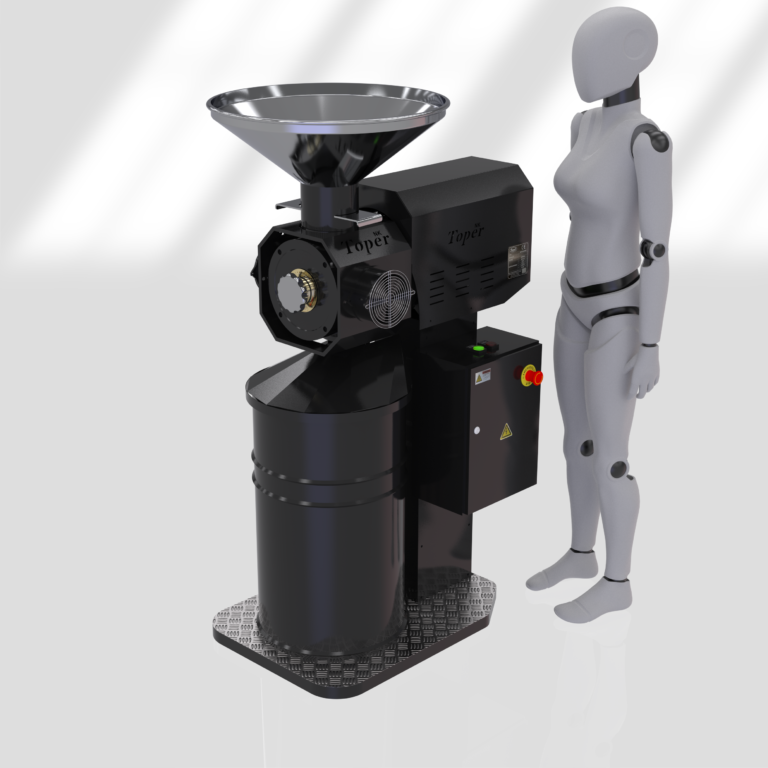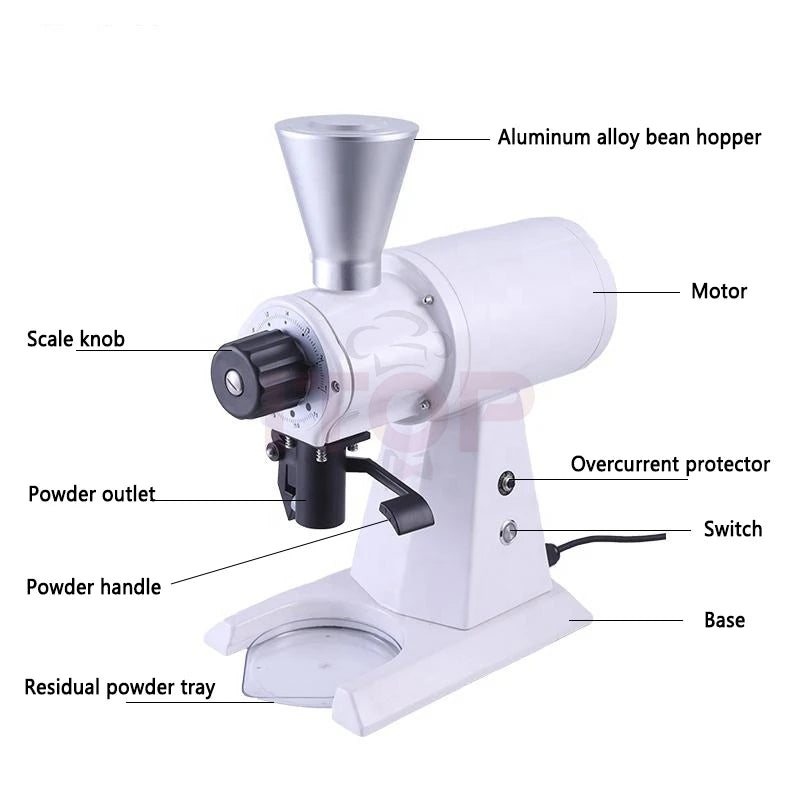Top Attributes to Seek in an Industrial Coffee Mill
When examining a commercial coffee mill, it is important to recognize crucial features that impact both efficiency and durability. Consistency in work size is crucial for optimum removal, while adjustable grinding speed enables an equilibrium in between effectiveness and quality. In addition, the option of materials and layout contributes significantly to durability and convenience of maintenance. The nuances of these attributes can greatly affect not just the high quality of coffee produced however additionally the general functional efficiency. Recognizing these aspects is crucial for making an informed decision that fulfills particular organization requirements.
Grind Size Uniformity
While different aspects can affect the high quality of made coffee, grind dimension consistency continues to be extremely important in achieving optimum removal. The harmony of coffee premises directly influences the developing procedure, as irregular fragment dimensions can cause over-extraction or under-extraction. This incongruity causes imbalanced flavors, where certain notes may be overpowering while others are silenced.
Industrial coffee grinders are developed to offer a high level of precision, typically employing burr grinding systems to ensure a consistent grind size. Unlike blade mills, which can create a mix of penalty and crude bits, burr grinders squash the beans between two surfaces, permitting much better control over work size. This uniformity is important throughout different brewing methods, whether espresso, French press, or pour-over, as each technique calls for specific work dimensions for ideal flavor removal.
In addition, consistency in work size adds to the total efficiency of the developing procedure. A consistent work permits for also water flow, lowering the risk of boosting and channeling removal effectiveness. In summary, buying an industrial coffee mill with a focus on work size consistency is crucial for attaining high-quality coffee with preferable taste profiles.
Grinding Rate
Grinding rate plays an essential duty in the total efficiency of commercial coffee grinders, straight affecting both the top quality of the grind and the effectiveness of the procedure. Industrial Coffee Grinder. Higher grinding rates can substantially enhance the throughput, making it possible to process larger amounts of coffee beans in a much shorter period. This is particularly crucial for companies that depend on high-volume manufacturing, such as coffee roasteries and coffee shops
However, while speed is crucial, it is equally essential to balance it with the high quality of the grind. Excessively high grinding rates can create warm, which may adversely influence the taste account of the coffee by causing the beans to lose necessary oils and scents. A grinder that provides adjustable rate setups can supply optimal adaptability, allowing operators to customize the grinding procedure according to specific requirements.
Furthermore, the grinding rate needs to correspond to guarantee uniformity in the grind size, further contributing to the overall taste and developing quality of the coffee. In recap, evaluating grinding speed is essential for selecting an industrial coffee grinder that satisfies both efficiency and high quality demands.
Build Quality and Resilience
The efficiency of an industrial coffee mill is not only established by its grinding rate; develop quality and resilience are equally important variables that affect long-lasting performance and integrity. A well-constructed grinder will certainly stand up to the rigors of daily usage, making it a sound investment for any kind of industrial operation.

Sturdiness also includes the grinder's electric motor and interior mechanisms. Industrial coffee mills should be equipped with durable motors with the ability of sustaining long term operation without overheating. Robust burrs are crucial, as they directly influence the quality of the work and add to the overall long life of the machine.

Convenience of Use and Upkeep
Constantly prioritizing convenience of use and upkeep can considerably boost the operational efficiency of a commercial coffee grinder. Straightforward functions such as instinctive controls and clear labeling are necessary for reducing downtime and ensuring that operators can promptly adapt to the tools. An ergonomic design, consisting of height-adjustable receptacles and available grinding chambers, permits for comfortable procedure and facilitates the loading and discharging of coffee beans.
In addition, simplicity of maintenance is vital for prolonging the life-span of the mill. Equipment with detachable components and components developed for quick cleaning can enhance upkeep tasks, decreasing the time invested on regular upkeep - Industrial Coffee Grinder. Search for mills that include self-cleaning devices or require very little disassembly, as these functions can conserve valuable labor hours
Furthermore, clear upkeep timetables and documentation are important. Mills that come with detailed individual guidebooks outlining maintenance procedures can help operators follow finest techniques, ensuring consistent performance and quality. By purchasing an industrial coffee mill that stresses convenience of usage and upkeep, businesses can improve efficiency, minimize link functional costs, and keep the high requirements anticipated in coffee manufacturing.


Noise Degree Decrease
When picking an industrial coffee grinder, sound degree decrease is a crucial factor that can significantly affect the work atmosphere. High noise levels can lead to employee fatigue, reduced concentration, and potential hearing damages with time, making it important to choose a grinder designed with sound-dampening features.
Search for grinders that incorporate advanced noise-reduction technologies, such as sound-insulated housings and vibration-dampening mounts. These features aid to decrease operational audios, developing a quieter environment for productivity. Industrial Coffee Grinder. Additionally, picking mills outfitted with low-noise motors can even more enhance audio decrease, making certain an extra pleasurable workplace
Consider the mill's overall layout. Models with integrated sound-absorbing products can considerably decrease sound emissions throughout grinding cycles. The placement of the mill within the office should be tactical. Placing it on a steady, hefty surface can aid to minimize vibrations that add to noise.
Eventually, purchasing a coffee grinder that focuses on sound reduction not just enhances the comfort of staff members but additionally aligns with a dedication to keeping a risk-free and effective workplace. This attention to information can bring about improved worker complete satisfaction and retention.
Verdict
In summary, selecting an industrial coffee grinder necessitates careful factor to consider of numerous vital functions. Grind click for info size consistency is essential for optimal removal, while flexible grinding speed assists in a balance between throughput and top quality.
Industrial coffee mills are created to offer a high level of accuracy, usually using burr grinding systems to guarantee a consistent work size. Unlike blade mills, which can produce a mix of fine and crude bits, burr grinders squash the beans between two surface areas, enabling for better control over work size. In summary, spending in a commercial coffee mill with a focus on grind dimension consistency is important for achieving top quality coffee with preferable flavor accounts.
Grinding speed plays a vital role in the general performance of commercial coffee grinders, directly influencing both the high quality of the work and the effectiveness of the operation. A mill that offers flexible rate settings can give ideal adaptability, enabling drivers to tailor the grinding procedure according to particular needs.
Comments on “Reasons Every Café Should Have an Industrial Coffee Grinder”